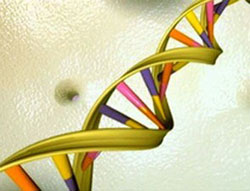Detecting gene variants causes high blood pressure
 US scientists have discovered two human genetic variants that are considered to be one of the causes of high blood pressure risk.
US scientists have discovered two human genetic variants that are considered to be one of the causes of high blood pressure risk.
Dr. Christopher Newton-Cheh of Massachusetts General Hospital in Boston and colleagues used genetic data of about 30,000 people in the US, Sweden and Finland to study the role of the two genes, NPPA and NPPB. According to the analysis, people with two versions of one of the "bad" gene variants of the two genes have an 18% higher risk of high blood pressure than those with only one or none. any version.
According to the scientists, these two genes produce what is called a Peptide bridge that stimulates sodium excretion in the urine, which is the protein involved in dilating blood vessels and excreting urine sodium. . Scientists have found that the common variants of these two genes have made people have low doses of proteins and therefore humans have a higher risk of developing high blood pressure.
Previously, scientists at the University of Maryland also discovered genetic variants associated with high blood pressure, opening up more effective treatments for the disease. The gene, called STK39, produces a protein that plays a role in helping the kidneys regulate salt levels in the body.
Scientists analyzed DNA of 542 people, cutting about 100,000 genes. The results showed that those with STK39 gene variant had hypertension and had a higher risk of developing the disease than those with the gene in common form.
Today, nearly half a billion people worldwide have high blood pressure. According to the medical community, people with high blood pressure are more likely to suffer from heart attack, stroke and kidney disease.
- What is high blood pressure for each subject?
- Find out the secret of increasing blood pressure
- Detection of genes involved in fatty liver disease
- Detection of genes related to high blood pressure
- Tibetans live on high mountains thanks to 'extinct relatives'
- What should I pay attention to on New Year's Day?
- Sleep immediately after lunch is prone to high blood pressure
- High blood pressure increases the risk of dementia in middle age by 45%
- There is a link between sleep and high blood pressure
- Find a simple 'medicine' to treat high blood pressure
- Use blood pressure monitor properly
- Eating habits affect high blood pressure
 Why do potatoes have eyes?
Why do potatoes have eyes? 'Tragedy' the world's largest carnivorous life: Death becomes ... public toilet
'Tragedy' the world's largest carnivorous life: Death becomes ... public toilet Tomatoes were once considered 'poisonous' for 200 years
Tomatoes were once considered 'poisonous' for 200 years Detecting microscopic parasites on human face
Detecting microscopic parasites on human face